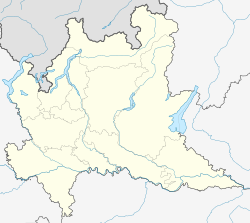
Capriate San Gervasio is a town and comune in the province of Bergamo, in Lombardy, northern Italy. As of 2019, its population was 8,216.

Seveso is a town and comune in the Province of Monza and Brianza, in the Region of Lombardy. The economy of the town has traditionally been based on the furniture industry.
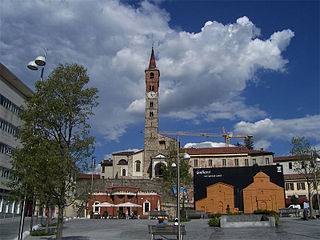
Cantù is a city and comune in the Province of Como, located at the center of the Brianza zone in Lombardy. It is the second largest city in Brianza.
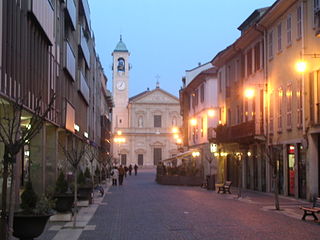
Saronno is a comune of Lombardy, Italy, in the province of Varese. It received the honorary title of city with a presidential decree in 1960. With an estimated population of 39351 inhabitants, it is the most densely populated among the big municipalities in its province.
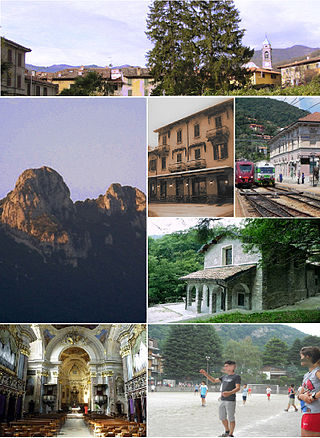
Canzo is a comune (municipality) of the Italian province of Como. It is the last town north of the historical Brianza region of Lombardy, capital of the Lake Como Triangle community and a regional tourism destination.

Seregno is a town and comune of the new Province of Monza and Brianza in the Italian region of Lombardy. Seregno received the honorary title of city by a presidential decree on 26 January 1979.
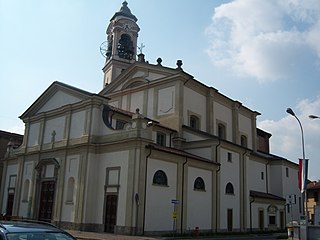
Cesano Maderno is a town and comune of about 39,309 inhabitants in the province of Monza and Brianza, Lombardy, northern Italy. The town borders with the towns of Seveso in the north, in the south with Bovisio-Masciago, in the east with Desio and Seregno, and in the west with Ceriano Laghetto and Cogliate. It received the honorary title of city with a presidential decree on 11 October 1999.

Cabiate is a comune (municipality) in the Province of Como in the Italian region Lombardy, located about 20 kilometres (12 mi) north of Milan and about 20 kilometres (12 mi) southeast of Como.

Barlassina is a comune (municipality) in the Province of Monza and Brianza in the Italian region Lombardy, located about 28 kilometres (17 mi) north of Milan and 17 kilometres (11 mi) south of Como. The town extends over two areas, the one to the east sloping down towards the Seveso valley and the one to the west higher than the rest of the town because it is located on the Groane plateau, surrounded on three sides by the Groane Park. The bordering municipalities are: Lentate sul Seveso to the north, Meda to the east, Seveso to the south/east, Cogliate to the west.

Bovisio-Masciago, is a comune (municipality) in the Province of Monza and Brianza in the Italian region Lombardy, located about 15 kilometres (9 mi) north of Milan.

Cogliate is a comune (municipality) in the Province of Monza and Brianza in the Italian region Lombardy, located 29 kilometres (18 mi) northwest of Milan.

Lazzate is a comune (municipality) in the Province of Monza and Brianza in the Italian region Lombardy, located about 25 kilometres (16 mi) northwest of Milan.

Lentate sul Seveso is a comune (municipality) in the Province of Monza and Brianza in the Italian region Lombardy, located about 25 kilometres (16 mi) north of Milan.
Misinto is a comune (municipality) in the Province of Monza and Brianza in the Italian region Lombardy, located about 25 kilometres (16 mi) northwest of Milan.

Casatenovo is a comune (municipality) in the Province of Lecco in the Italian region of Lombardy, about 30 kilometres (19 mi) northeast of Milan and about 20 kilometres (12 mi) southwest of Lecco. As of 2011, it had a population of about 12,700.
Malgrate is a comune (municipality) in the Province of Lecco, in the Italian region Lombardy. Malgrate is located across from Lecco, which is geographically divided by the Lake Como. According to 31 December 2004 demographic data, it has a population of 4,233 in an area of 2.0 square kilometres (0.77 sq mi). It is located about 45 kilometres (28 mi) northeast of Milan, the main city in Northern Italy.
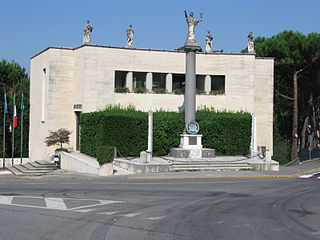
Missaglia is a comune (municipality) in the Province of Lecco in the Italian Lombardy region, located at the centre of the area known as the Meratese. As of 31 December 2004, it had a population of 7,805. The comune, which covers an area of 11 square kilometres (4.2 sq mi), contains the frazioni of Contra, Lomaniga, Maresso and Missagliola

San Maurizio al Monastero Maggiore is a church in Milan, Northern Italy. It was originally attached to the most important female convent of the Benedictines in the city, Monastero Maggiore, which is now in use as the Civic Archaeological Museum. The church today is used every Sunday from October to June to celebrate in the Byzantine Rite, in Greek according to the Italo-Albanian tradition. It is also used as a concert hall.

Oratory of Saint Stephen (Italian: Oratorio di Santo Stefano is a Roman Catholic chapel in the town of Lentate sul Seveso, in the Province of Monza and Brianza and the region of Lombardy, Italy.
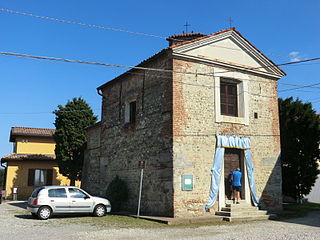
The Oratory of Saint Stephen is a Roman Catholic chapel in Mocchirolo in the town of Lentate sul Seveso, part of the Province of Monza and Brianza, Lombardy, northern Italy.




